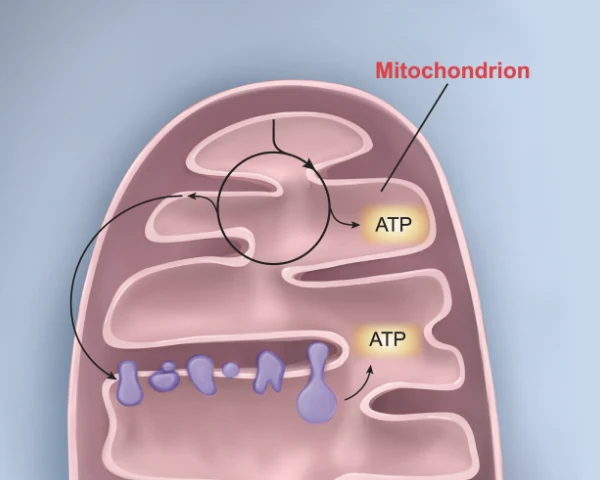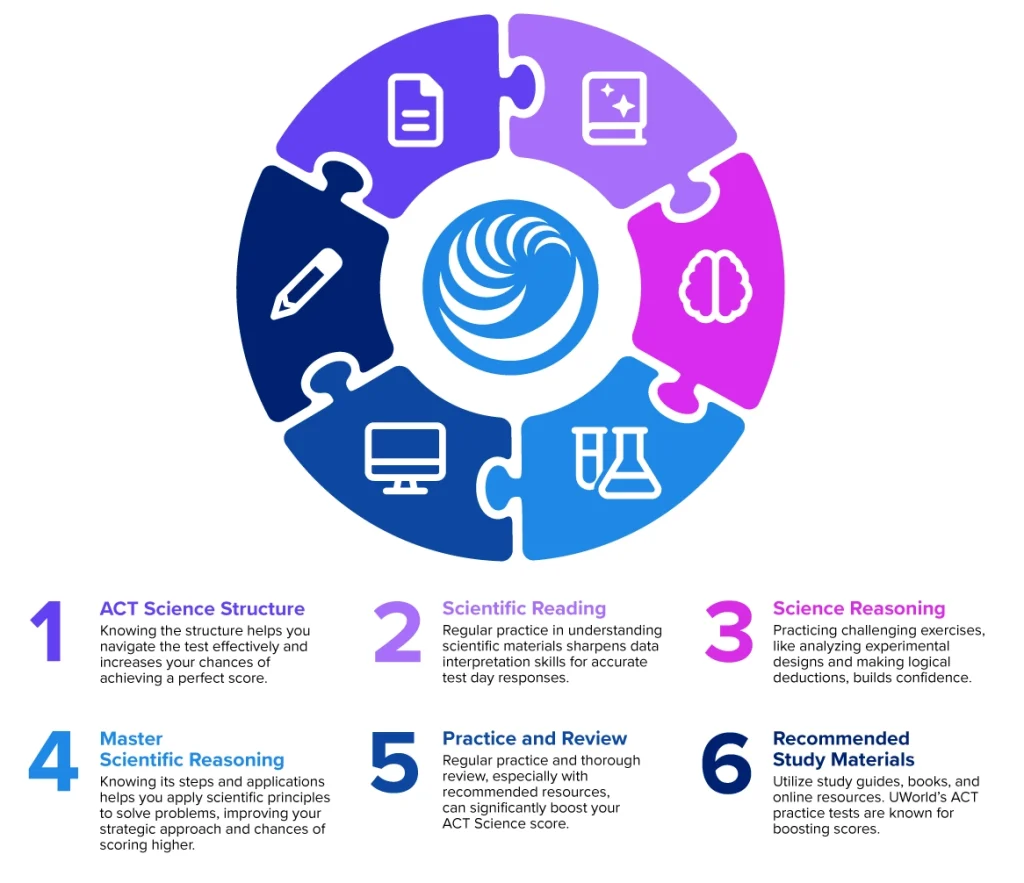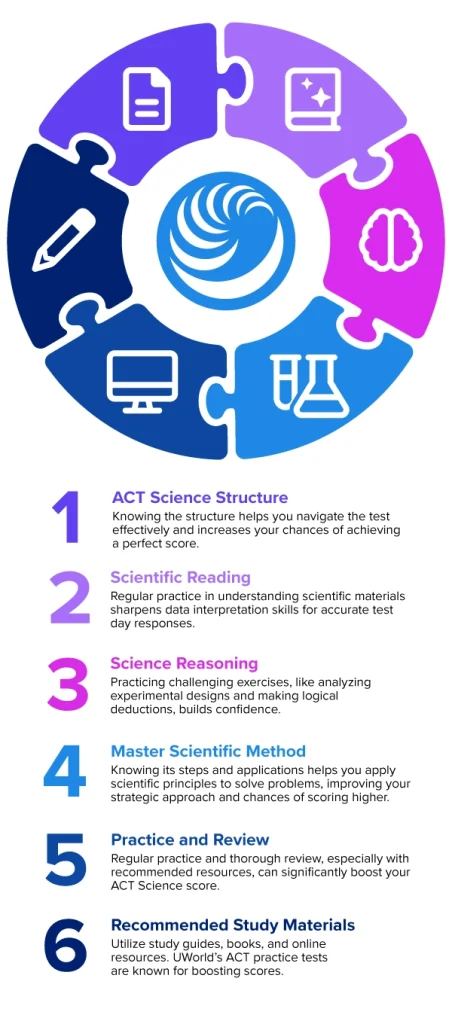With the right tips and approach, you too can aim for that perfect 36. Let's dive into understanding the ACT Science section and uncover the strategies that will help you reach your goal.
Understanding the ACT Science Section
The ACT Science section evaluates your ability to interpret and analyze scientific information. It consists of 40 multiple-choice questions that you need to answer within a time limit of 35 minutes.
Format and types of questions
- Passages: The Science section typically includes seven passages, each followed by 5-7 questions. These passages cover various scientific topics such as biology, chemistry, physics, and earth/space sciences.
- Question Types: The questions in this section assess your skills in data analysis, scientific reasoning, and critical thinking. You'll encounter various types of questions, including interpreting graphs, tables, and experimental data, understanding experimental design, making inferences, and applying scientific concepts.
To know more about the format, syllabus, and scoring pattern of ACT Science, read our article on "About the ACT Science Test".
Importance of achieving a high score
Understanding the format and importance of the ACT Science section is the first step towards achieving a high score. Scoring high on the science section is crucial for several reasons:
- College Admissions: Many colleges and universities consider ACT scores during admissions. A high score can enhance your chances of getting into your desired institution.
- Scholarship Opportunities: Some scholarships require a minimum ACT score, and a strong performance in all sections can make you eligible for more scholarships.
- Academic Preparedness: Success in the Science section indicates proficiency in scientific reasoning and data analysis, essential for various college majors and future careers in science, technology, engineering, and mathematics (STEM) fields.
6 Key Strategies You Should Know to Improve Your ACT Science Score
Are you ready to boost your ACT Science score? We are sharing some easy-to-follow tips and tricks to help you understand and tackle this section.
Strategy 1: Familiarize Yourself with the Test Structure
The first step in learning how to get a 36 on act science is understanding its components to excel in the ACT Science section. This section consists of passages that delve into different scientific topics. After this, you'll encounter questions evaluating your data analysis skills and ability to draw conclusions. By acquainting yourself with this format, you'll boost your confidence and be better prepared to answer each question, bringing you closer to achieving a perfect score.
Strategy 2: Practice Reading Scientific Materials
Improving your understanding of graphs, studies, and data analysis is vital for succeeding in the Science section. Make it a habit to regularly practice reading scientific materials, focusing on comprehending the information presented and identifying patterns. This will enhance your ability to interpret complex data, making it easier to accurately answer questions on test day.
Strategy 3: Enhance Your Science Reasoning Skills
Mastering critical thinking in a scientific context is essential to succeeding in the ACT Science section. Engage in exercises and techniques that challenge your reasoning abilities, like analyzing experimental designs and drawing logical conclusions from scientific evidence. Improving these skills gives you the confidence to tackle even the toughest questions.
Strategy 4: Master the Scientific Method and Its Applications
To answer ACT Science questions effectively, you need a solid understanding of the scientific method. Familiarize yourself with its steps and how it is used, as many test questions ask you to apply scientific principles to solve problems. By mastering the scientific method, you'll be better equipped to tackle each question strategically and increase your chances of getting a higher score.
Strategy 5: Practice and Review Thoroughly
Regularly practicing with resources like UWorld's ACT practice tests is important for improving your score in the Science section. These practice tests are designed to simulate the actual exam conditions, helping you become familiar with the format and timing of the test. After each practice session, it's essential to carefully review your answers to identify areas where you can improve and fine-tune your test-taking strategies.
Strategy 6: Study Materials and Resources You Should Consider
When it comes to preparing for ACT Science, you have numerous study materials to choose from, including textbooks and online resources. Among these options, UWorld's practice tests stand out for their comprehensive approach and effectiveness in helping you strive for a perfect score in ACT Science.
Why Choose UWorld?
- Authentic Practice: UWorld’s ACT Science practice tests closely emulate the actual exam environment, giving you a realistic preview of what awaits on test day.
- Detailed Insights: Each question is accompanied by thorough explanations, aiding your understanding of why certain answers are correct while others are not.
- Progress Monitoring: With UWorld’s performance tracking feature, you can monitor your advancement and pinpoint areas where you can improve your ACT Science score.
- Tailored Learning: UWorld adapts to your performance, providing targeted practice in the areas where you need it the most.
Don't just take our word for it—listen to what our satisfied users have to say:
When I was getting ready for the ACT Science part, I was kind of lost with all the study stuff out there. But then I found UWorld's practice tests. They felt just like the real deal, and they explained things really well. Because of UWorld, I got way better at science stuff and felt super ready for the test! - Jake, UWorld user
Ready to elevate your ACT preparation? Check out UWorld's ACT practice tests.
Crucial Last-Minute Strategies to Improve Your ACT Science Score
Getting ready for the ACT Science section might make you a bit nervous, but don't worry! With these last-minute tips, you'll feel totally prepared to take it on with confidence!
Tip 1: Prioritize Sleep and Healthy Eating
Taking care of your physical health is crucial for performing well on the ACT Science section. Research1 shows that getting enough sleep and eating nutritious foods2 can significantly impact academic performance. Make sure to get a good night's sleep before the exam and fuel your body with healthy foods to keep your mind sharp and focused during the test.
Tip 2: Develop a Strategic Plan for Exam Day
On the day of the ACT, it's essential to have a plan in place to ensure smooth sailing. Make sure to gather all necessary materials, such as your admission ticket, identification, calculator, and snacks. Strategize how you'll use your time during the ACT Science section, allocating enough time for each passage and question. Be mindful of common pitfalls, such as spending too much time on difficult questions, and have strategies in place to overcome them.
Overview of Pitfalls:
Many students have difficulty managing their time and may become stuck on difficult questions, resulting in a hurried approach to the remaining section. To prevent this, it's crucial to maintain a steady pace and set aside challenging questions to revisit later, if time allows. Additionally, some students might feel overwhelmed by the abundance of scientific information presented in the passages. To overcome this, focus on understanding the main ideas and key information instead of getting lost in the details. For more guidance on the typical errors students make on the ACT Science section and effective strategies to avoid them, we suggest reading our article on Common Mistakes You Should Avoid in ACT Science.

References
- 1Owens, J. A. (2014). Insufficient sleep in adolescents and young adults: An update on causes and consequences. Pediatrics. Retrieved on April 30, 2024 from https://pubmed.ncbi.nlm.nih.gov/25157012/
- 2Rampersaud, G. C., Pereira, M. A., Girard, B. L., Adams, J., & Metzl, J. D. (2005). Breakfast habits, nutritional status, body weight, and academic performance in children and adolescents. Journal of the American Dietetic Association. Retrieved on April 30, 2024 from https://pubmed.ncbi.nlm.nih.gov/15883552/








